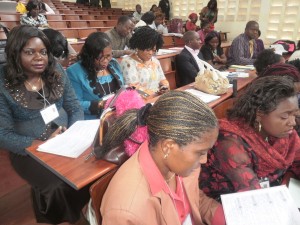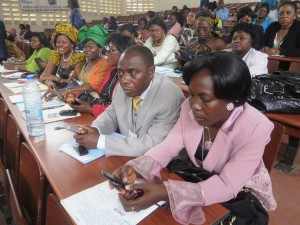By Walter Wilson Nana
Teachers of English language and Literature in secondary and high schools in Cameroon are gearing up for the 2012/2013 academic year on a special note. Through the Cameroon English Language & Literature Teachers Association, CAMELTA, the more than 500 teachers gathered at the University of Buea, UB, Amphi 750 August 15 to 17 2012 to revise their notes and carry on with the activities of their 11th Annual Congress.
According to Harry Kutcha, CAMELTA’s National Vice President in charge of International Outreach, they are interested in bridging Cameroon government’s policy on the teaching of the aforementioned subjects and the practice in the classrooms. “We teach with our deeds. We help our teachers in their endeavours in the classroom by bringing people to tell their success stories, share their skills, their challenges and how they were overcome,” he said
Kutcha said CAMELTA is out to encourage teachers to learn from their peers and bridge the gap between policies from the country’s ministry of education and the teachers. “Sometimes, there are pockets of resistance from the teachers, when they do not understand what government policies are all about. So, we use examples of successful teachers in the system to encourage others on new ideas and welcome the good things they have been doing,” he explained. “The many workshops and plenary sessions were aimed at chipping in new trends in the teaching of English Language and Literature,” he added.
Kutcha noted that Cameroon employs her own English teachers, which is unique but there is still room for the universality of the English language to be followed. “We encourage continuous research on the English language and to also show our own indigenous communication skills in the language. If we understand the English language of other people, they should also understand our own English language. There is a basic universality in the language and that is part of CAMELTA’s concerns so that our children can communicate with anybody in the world,” he said.
CAMELTA’s National Secretary, Nambi Nzeyangha said theirs is to avoid teacher isolation in a setting where there is absence of in service training from the government. “CAMELTA does training for the teachers for free. For eleven years, beginning from the Divisional, Regional and National levels, we’ve had congresses to enable teachers share experiences, how to handle their large classes of students, work in resource challenge situations and help the learner learn English language without influence from other languages,” she added.
Nambi said the new trends in technology should instead make for better English language and not an opportunity for digression, especially to the learner.
This teacher of English language for 28 years saw in it the vehicle that helps the students to cut across the content subjects. For three days, they had twenty-eight workshops aimed at ameliorating their methodologies while in class. “If you do not understand the English language, how do you answer the questions raised in the content subjects?” she asked rhetorically.
She enjoined the rest of her colleagues to join CAMELTA and progressively build their capacities in the teaching of English language and Literature, while reiterating the relevance to always learn something new though one may be a professional in the field. “Proprietors of private schools should also give their teachers in the subjects in question the opportunities to learn new developments in the subjects. Some have never been trained in the subjects yet they are into it. They must be trained. CAMELTA is interested in that,” Nambi mentioned.
Simon Abore, President, Southwest Regional Chapter, CAMELTA and English language teacher at Bilingual Grammar School, Molyko, Buea said English language in the Region is not the best because more teachers have decided to stay in the urban centres and neglected the rural areas. However, he invited all his colleagues to join the folk so that they can continue to benefit from training and scholarship opportunities from the International Association of English language teachers, TISOL, US-based, where CAMELTA is affiliated and the International Association of teachers of English as a foreign language, ITOEFL, in UK.
The CAMELTA 11th Annual Congress had as theme: Achieving excellence in English language teaching – setting the pace in tune with the changing times.





